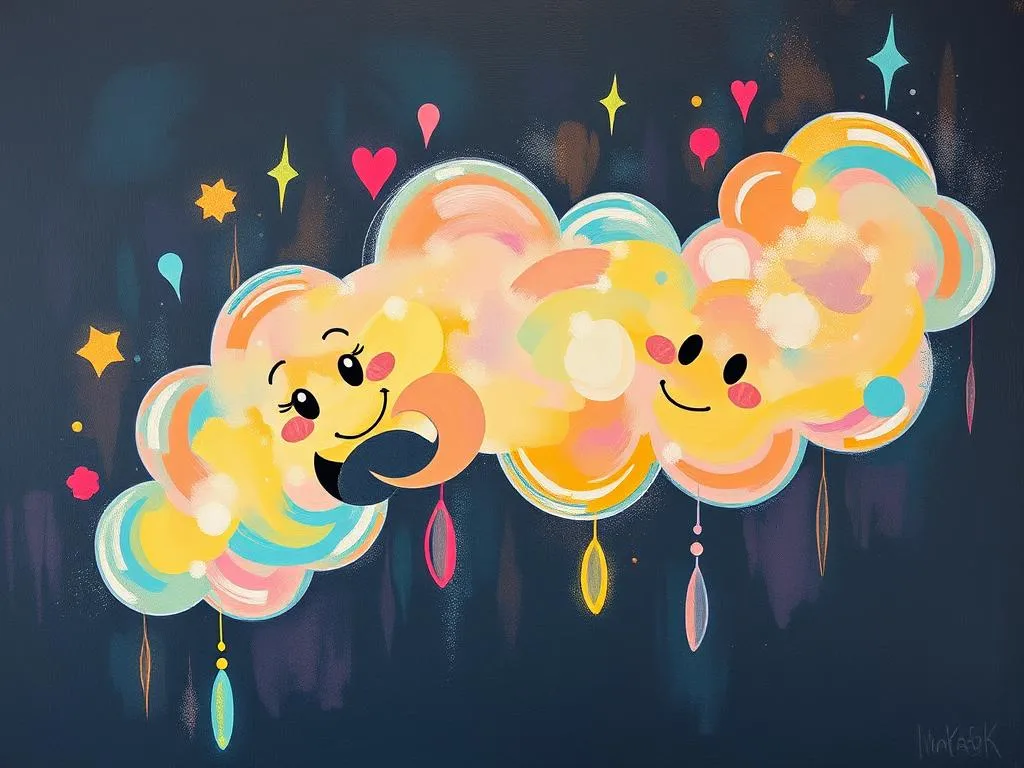
Have you ever woken up from a dream feeling like you just had a conversation with your own soul? Dreams can be a mysterious realm where emotions bubble to the surface, revealing deeper truths about our waking lives. They often serve as a bridge between our conscious thoughts and the hidden layers of our psyche, allowing us to explore feelings we might not consciously acknowledge. In this journey into the world of dreams, we will unravel the symbolism behind emotional conversations that occur in our sleep, offering insights that can serve as a guide for your personal growth.
As you navigate through the intricate tapestry of your dreams, you might find that they echo your fears, desires, and unresolved issues. By understanding the emotional language of your dreams, you can begin to decode the messages they carry. Together, let’s explore the symbolic significance of dream conversations and how they can illuminate your path toward self-awareness and emotional well-being.
Whispering Shadows: The Language of Symbols
Dreams communicate in a unique symbolic language that can often feel cryptic at first. Imagine that every person, object, or scenario in your dream is a symbol reflecting your innermost thoughts and feelings. When you dream of having a conversation, it’s not just about the words exchanged; it’s about the underlying emotional currents that shape the dialogue.
Emotional symbols can vary widely based on cultural contexts and personal experiences. For instance, in some cultures, dreaming of a deceased loved one may symbolize a desire for closure or unresolved grief. In contrast, in other contexts, such dreams can signify a connection to ancestral wisdom or guidance. Similarly, if you dream of having a heated argument, it could reveal suppressed anger or a need to assert yourself in waking life.
In psychological terms, these dream conversations often act as a projection of our internal struggles. Sigmund Freud believed that dreams are a window into our subconscious desires, while Carl Jung emphasized the role of archetypes and collective unconscious in shaping our dream experiences. Thus, when analyzing your dreams, consider the emotions tied to the conversations. Are you feeling anxious, conflicted, or perhaps empowered? These feelings are crucial to interpreting the dream’s message.
Another layer to consider is the role of characters in your dreams. A conversation with a friend might reveal aspects of your relationship you haven’t fully acknowledged, while a dialogue with a stranger could symbolize parts of yourself that are unfamiliar or unaccepted. By reflecting on who is speaking and what is being said, you can gain invaluable insights into your emotional landscape.
Dream Dialogues: Tales of Emotion
To further illustrate how emotional conversations manifest in our dreams, let’s explore a few scenarios. Each of these dreams can reveal something unique about your inner world.
Scenario 1: The Argument with a Loved One
Imagine dreaming of a heated argument with your partner, where unresolved issues surface. This dream may symbolize your fear of conflict or your desire for clarity in the relationship. It could be an invitation to address lingering issues or to communicate more openly in your waking life.
Scenario 2: A Heartfelt Conversation with a Deceased Relative
In another dream, you find yourself sharing a laugh and a deep conversation with a deceased family member. This dream often represents a longing for connection and can be a powerful reminder of unresolved emotions surrounding loss. It might encourage you to express feelings you held back while they were alive.
Scenario 3: A Surprise Encounter with an Old Friend
You dream of running into an old friend and reminiscing about the past. This scenario often reflects feelings of nostalgia and may signify a need to reconnect with parts of yourself that you’ve neglected. It highlights the importance of friendships and shared experiences in shaping your identity.
Scenario 4: A Debate with a Colleague
In this dream, you find yourself in a spirited debate with a colleague about a project. This interaction could symbolize your desire for recognition and respect in your professional life. It might also indicate feelings of competitiveness or a need to assert your opinions more confidently.
Scenario 5: A Silent Conversation with Yourself
Sometimes, you may dream of standing alone, engaging in a silent dialogue with your own reflection. This powerful imagery often signifies a deep self-exploration process, encouraging you to confront your fears and desires. It’s a call for introspection and understanding of your emotional needs.
Each of these scenarios serves as a reminder that the conversations we have in our dreams can be profound reflections of our waking lives. They encourage us to engage with our emotions, confront unresolved issues, and seek deeper connections within ourselves and with others.
Awakening the Self: Emotional Growth Through Dreams
As we reflect on the emotional conversations that arise in our dreams, it’s essential to consider how these experiences can facilitate personal growth. Understanding the messages embedded in your dreams can inspire you to take action in your waking life.
Firstly, journaling about your dreams can be a powerful tool for self-discovery. Write down the details of your dreams immediately upon waking, focusing on the characters, emotions, and dialogues you encountered. Over time, you may begin to notice patterns or recurring themes that can offer clarity on your emotional state.
Secondly, cultivate a practice of mindfulness and self-reflection. Spend a few moments each day tuning into your emotions. Ask yourself what you are feeling and why. This practice can help you connect the dots between your dreams and your waking life, allowing you to address any unresolved feelings that may surface.
Additionally, consider discussing your dreams with trusted friends or a therapist. Sometimes, sharing your dream experiences can unveil new perspectives and insights. A conversation about your dreams can foster deeper connections and lead to meaningful discussions about your emotional well-being.
Lastly, embrace the power of creativity. Use your dreams as inspiration for artistic expression, whether it be through writing, painting, or music. Channeling your emotions into creative outlets can be incredibly therapeutic, transforming your dream experiences into something tangible and meaningful.
Remember, dreams are not merely whimsical narratives; they are profound reflections of your inner world. By embracing the lessons they offer, you can embark on a journey of self-exploration and emotional healing.
As you continue to explore the landscape of your dreams, keep this powerful reflection in mind: Your dreams are a conversation with your soul, guiding you towards the truth you seek. Embrace this dialogue, and let it illuminate the path toward greater self-awareness and emotional fulfillment.







